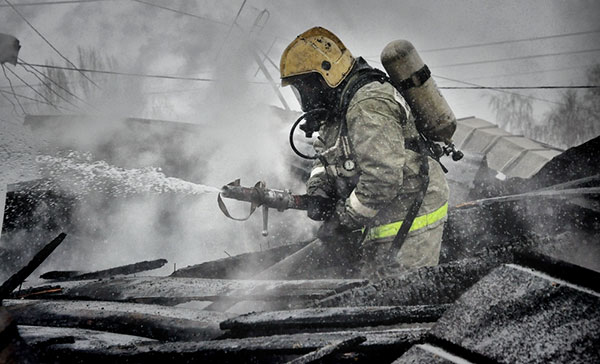Fire-Resistant Roofing Materials for Commercial Roofs
Author: Sheryll Poe | July 10, 2023
Choosing the right roof for a commercial business can be complicated. There's a lot to consider in terms of durability, efficiency and costs. But one thing a business owner shouldn't have to worry about is whether their roof is fire-resistant, particularly if the business is located in fire-prone areas.

According to the National Fire Protection Association (NFPA), there were an estimated 1.4 million fires in the United States in 2020. Of those fires, 11,000 were in non-residential buildings, including retail, office, manufacturing and industrial structures. As a result, those non-residential structure fires caused $3.4 billion in direct property damage.
For business owners, having a fire-resistant commercial roof is not just about peace of mind — it can also save a business.
Fire-Resistant Roofing Categories
Commercial roofs come in four different fire rating categories: Class A, B, C and Unrated.
Class A roofing materials are the optimum and most common choice for any commercial building. Class A roofing materials include metal roofing, clay, concrete or slate tiles, and asphalt composition shingles as well as the most common commercial roofing materials, PVC and TPO.
Class B roofing materials are materials not commonly found on most commercial buildings, including pressure-treated shakes and shingles.
Commercial roofs with Class C materials — which include untreated wood shakes and shingles, plywood and particle board — are also very uncommon and would not meet most building codes, even in predominantly historic commercial districts.
Unrated roofing materials provide little to no fire resistance and would not meet even the most lenient commercial building codes.
Which Fire-Resistant Roofing Material Should You Use?
TPO
TPO is flexible, easy to install and long-wearing. A TPO roof should last ten to 15 years. It is also ENERGY STAR rated and meets the higher standard for California's Title 24. TPO is resistant to most environmental impacts, including mold or microbial growth, chemicals, grease, oils, UV and ozone, making it the perfect energy-efficient choice for a wide variety of commercial buildings, including industrial or manufacturing facilities.
PVC
PVC is a strong and stable commercial roofing material resistant to damage and offers protection against chemicals, water leaks and UV rays. Due to the large amounts of chlorine included in PVC's formulation (that's the chloride in polyvinyl chloride), PVC is a fire retardant material and resistant to ignition. PVC is particularly good for businesses that emit fats or oils from their ventilation systems, such as restaurants or other food manufacturing facilities.
EPDM
EPDM is another popular commercial roofing material. It's a thick, durable rubberized roofing material used exclusively in commercial settings, particularly on buildings with flat or low-pitch roofs. EPDM is easy to install and repair and can last 40 years or more with minimal maintenance. EPDM is not inherently fire-resistant. However, with the right application, including the addition of an external fire retardant coating, EPDM can achieve a Class A fire rating. Just check to make sure the coating doesn't void the manufacturer's warranty.
Educate Your Customers on Fire-Resistant Materials
When it comes to commercial roofs, there are many different kinds of materials to choose from that are resistant to fire. These products can protect buildings against flame penetration into a building and work to block any fire spread. Business owners will often turn to their trusted roofing contractor to discuss the different materials available and which material is best for their particular situation. By being aware of the best types of fire-resistant roofing materials for commercial roofs, you can put your customers' minds at ease.